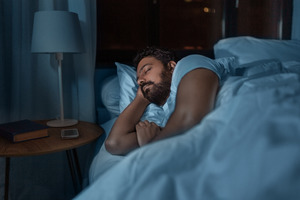
If you have sleep apnea, it’s important to take whatever steps you can to keep the disorder under control so that you can enjoy a good night’s slumber again. In addition to talking to your sleep dentist to see what treatments are available, you should also take the time to think about changes you can make at home to improve the quality of your rest – which can potentially mean making sure the temperature in your bedroom is just right. Here’s a quick look at the impact temperature can have on sleep apnea.
What Exactly Is Sleep Apnea?
Having sleep apnea means that your breathing is repeatedly stopping and restarting while you’re asleep. In most cases, this disorder is the result of the airway becoming blocked by tissues in your throat. Each pause forces your body to wake up briefly in an effort to get some air, thus pulling you out of the sleep cycle. Untreated sleep apnea can leave you feeling exhausted during the day, and it can ultimately lead to dire health consequences like an increased risk for heart problems.
How Can Temperature Make Sleep Apnea Worse?
If you are already having trouble getting enough rest due to sleep apnea, high temperatures can exacerbate the problem. The body’s temperature naturally goes down whenever you go to sleep. However, maintaining the right sleeping temperature is more difficult if your bedroom is too hot. Consequently, you will be more likely to wake up prematurely, which is an especially serious issue if sleep apnea is already frequently interrupting your slumber.
What Can You Do to Keep Your Sleep Apnea Under Control?
If you think the temperature in your bedroom is making your sleep apnea worse, the obvious thing to do is adjust it before you go to bed. Experts say that the right temperature for sleep is in the range of 60 to 67 degrees Fahrenheit.
During particularly hot times of the year, it may be worth taking additional measures to help your body stay cool while you’re asleep. One possible step you can take is putting a fan next to your bed. You might also want to think about taking off the comforter.
If you’re not sure what changes you should be making at home to manage your sleep apnea, remember that you can always talk to your sleep dentist. They can give you advice on the steps you should take to keep your sleep interruptions to a minimum. Just be sure to act quickly; it’s important to get your sleep apnea under control as soon as possible.
About the Author
Dr. Keane Fedosky went to the Baylor College of Dentistry, eventually graduating in 1991. He is a Diplomate of the American Board of Dental Sleep Medicine and is a proud member of the American Academy of Dental Sleep Medicine. He offers oral appliances as an alternative to CPAP devices for sleep apnea treatment. To schedule a consultation with Dr. Fedosky at Sleep Rehab in Plano, visit his website or call (972) 753-3737.
